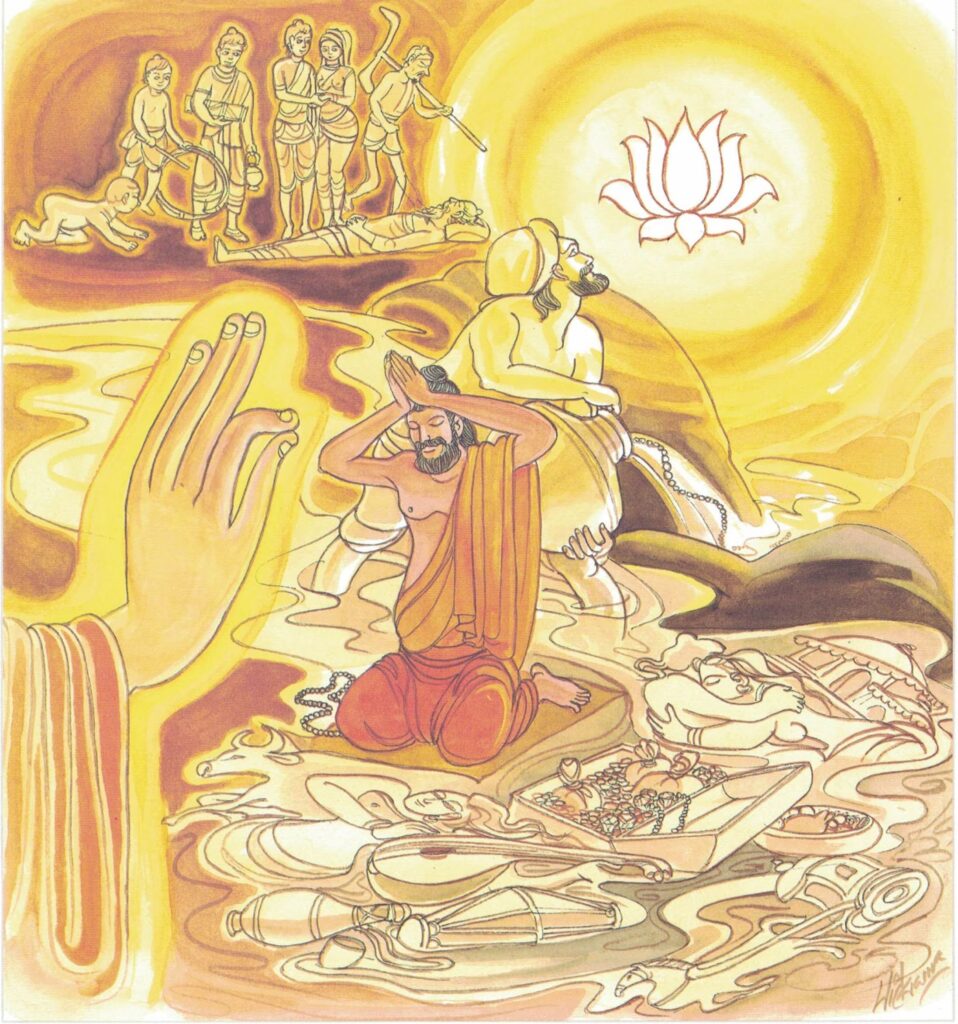Pali text, illustration and English translation of Dhammapada verse 383:
chinda sotaṃ parakkamma kāme panuda brāhmaṇa |
saṅkhārānaṃ khayaṃ ñatvā akataññū’si brāhmaṇa || 383 ||
383. O brahmin, strive and cleave the stream, desires of sense discard, knowing conditioned things decay be Knower-of-the-Uncreate.

The Story of the Brāhmin who had Great Faith
While residing at the Jetavana Monastery, the Buddha spoke this verse with reference to a brāhmin who showed extreme devotion to some monks.
The story goes that this brāhmin once heard the Buddha preach the Dhamma, and was so delighted that he thereafter gave food regularly to sixteen monks at his house. When the monks came, he would take their bowls and say, “May the Venerable arahats draw near! May the Venerable arahats sit down!” No matter whom he addressed, he greeted all of the monks with the title Arahats. Now those of the monks who had not yet attained the fruit of conversion thought to themselves, “This layman does not know that we have not attained arahatship.” The result was that all of the monks became embarrassed and stopped going to his house.
This made the layman very sad and sorrowful. “Why pray do the noble monks no longer come to my house?” thought he. So he went to the monastery, saluted the Buddha, and told him what had happened. then the Buddha addressed the monks and asked them, “Monks, what does this mean?” The monks told him what had happened. Said the Buddha, “But, monks, do you not like to have him greet you as arahats?” “No, Venerable, we do not like it.” “Nevertheless, monks, this is only an expression of the joy which men feel; and no fault can be found with an expression of joy. Now the love of the brāhmin for the arahats is boundless. Therefore, it is proper that you too should sever the stream of craving and be satisfied with nothing less than the attainment of arahatship.”
Explanatory Translation (Verse 383)
brāhmaṇa parakkamma sotaṃ chinda kāme panuda
brāhmaṇa saṅkhārānaṃ khayaṃ ñatvā akataññū asi
brāhmaṇa: O’ brāhmin; parakkamma: try hard;make all the necessary effort; chinda: cut off; sotaṃ [sota]: the stream; kāme: sensual desires; panuda: get rid of; saṅkhārānaṃ [saṅkhārāna]: of the conditioned things; khayaṃ [khaya]: erosion; ñatvā: having known; akataññūsi: become a knower of the uncreated
Exert all you can and cut off the stream of existence. Get rid of passion. Get to know the erosion of the conditioned things. And, they become a knower of the uncreated–Nibbāna.
Commentary and exegetical material (Verse 383)
sotaṃ chinda: cut the stream. Here, the stream is craving. One who has cut the stream will become a stream-winner–sotāpanna. A stream-winner is no more a worldling (puthujjana), but an Ariya (noble).
On attaining this first stage of sainthood, he eradicates the following three fetters (saṃyojana) that bind him to existence, namely:
(1) sakkāya-diṭṭhi–literally, view when a group or compound exists. Here kāya refers to the five aggregates of matter feeling, perception, mental states, and consciousness. the view that there exists an unchanging entity, a permanent soul, when there is a complex compound of psycho-physical aggregates is termed sakkāya-diṭṭhi. Dhammasaṅgani enumerates twenty kinds of such soul-theories. Sakkāya-diṭṭhi is usually rendered as selfillusion, theory of individuality, or illusion of individualism;
(2) vicikiccā–doubts. They are doubts about (i) the Buddha, (ii) the Dhamma, (iii) the Sangha, (iv) the disciplinary rules (sikkhā), (v) the past, (vi) the future, (vii) both the past and the future, and (viii) dependent origination (paticca-samuppāda);
(3) silabbataparāmāsa–adherence to (wrongful) rites and ceremonies.
The Dhammasaṅgani explains it thus: It is the theory held by ascetics and brāhmins outside this doctrine that purification is obtained by rules of moral conduct and rites.